最新非谓语动词作状语
高考英语非谓语动词作状语的用法 知识点
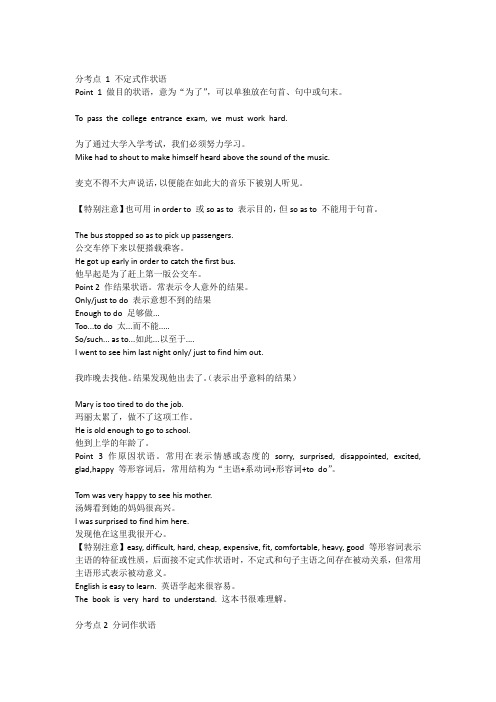
分考点1 不定式作状语Point 1 做目的状语,意为“为了”,可以单独放在句首、句中或句末。
To pass the college entrance exam, we must work hard.为了通过大学入学考试,我们必须努力学习。
Mike had to shout to make himself heard above the sound of the music.麦克不得不大声说话,以便能在如此大的音乐下被别人听见。
【特别注意】也可用in order to 或so as to 表示目的,但so as to 不能用于句首。
The bus stopped so as to pick up passengers.公交车停下来以便搭载乘客。
He got up early in order to catch the first bus.他早起是为了赶上第一版公交车。
Point 2 作结果状语。
常表示令人意外的结果。
Only/just to do 表示意想不到的结果Enough to do 足够做...Too...to do 太...而不能.....So/such... as to...如此...以至于....I went to see him last night only/ just to find him out.我昨晚去找他。
结果发现他出去了。
(表示出乎意料的结果)Mary is too tired to do the job.玛丽太累了,做不了这项工作。
He is old enough to go to school.他到上学的年龄了。
Point 3 作原因状语。
常用在表示情感或态度的sorry, surprised, disappointed, excited, glad,happy 等形容词后,常用结构为“主语+系动词+形容词+to do”。
Tom was very happy to see his mother.汤姆看到她的妈妈很高兴。
非谓语动词做状语

非谓语动词做状语非谓语动词作为状语是指在句子中不能作谓语,但可以做状语的动词形式。
它可以作时间、原因、条件、让步、结果等状语,可以提供句子里的信息,使句子充实而生动。
一、非谓语动词作时间状语1.由过去分词组成的状语过去分词表示过去发生的动作,常用于主句为一般现在时或一般将来时的句子中,作时间状语,突出主句动作应该在过去发生。
如:He left without saying goodbye, leaving me standing there alone.他没有说再见就走了,留下我独自站在那里。
2.由现在分词组成的状语现在分词表示正在进行的动作,常用于主句为一般现在时或一般将来时的句子中,作时间状语,突出主句动作应该正在进行。
如:She comes to visit us every week, bringing us some nice food.她每周都会来看望我们,并带来一些美食。
3.由having done 组成的状语having done 表示过去已经完成的动作,常用于主句为一般现在时或一般将来时的句子中,作时间状语,突出主句动作应该在过去完成的动作之后发生。
如:Having finished the exam, he went home and had a good rest.考试结束之后,他回家好好休息了。
二、非谓语动词作原因状语由because of,due to,owing to,thanks to等引导,接名词或动词不定式,作原因状语,表示主句动作的原因。
如:Because of the heavy rain, we had to cancel our picnic.由于下雨,我们不得不取消野餐了。
三、非谓语动词作条件状语由if,unless,in case,on condition that,provided (that),supposing (that)等引导,接动词不定式,作条件状语,表示“假设”的意思,表示主句动作的前提,即要想主句动作成立,必须满足什么条件。
非谓语动词做状语

二. done/being done/having been done 做状语 主语与非谓语动词之间为被动关系; having been done 发生在主句谓语动词之前
1. Seen from the top of the mountain, the city looks beautiful.
2. Compared with those who lived in the slums, Children here are really lucky.
过去分词可以以下成分:
1.表语 The teacher is moved. 2. 定语 I don’t like the man talked about at the party. 3. 宾补 We heard a song sung in her room. 4. 状语 Lost in a newspaper, She didn’t notice me.
He is too careful not to have noticed that. 他那么小心,肯定会注意到那一点的。 She is too sad not to help crying. 她那么伤心,忍不住哭了。 I am only too glad to help you.我很高兴能帮助你。 I am only never too glad to know you. 认识你我再高兴不过了。
s )
一. 非谓语动词做状语的形式: 二. doing/ having done 三. done/being done/having been done 四. to do/ to be done
五. 二. 做题方法:析句子结构,找逻辑主语, 辩逻辑关系,判动词先后
If I am given more time, I’ ll catch up with you.
非谓语动词作状语

非谓语动词作状语,其逻辑主语须与主句主语保持一致。
若不一致,非谓语动词形式须另带主语,从而构成复合结构的形式作状语。
这种结构称为“独立结构”。
其中,非谓语动词主动用现在分词,被动用过去分词。
非谓语动词及其短语前面带有逻辑主语,逻辑主语的代词又是主格,故常称为“独立主格”。
“独立结构”在句中起状语作用,相当于状语从句,表示时间、原因、条件、方式或伴随等情况。
功能独立主格结构主要用于描绘性文字中,其作用相当于一个状语从句,常用来表示时间、原因、条件、行为方式或伴随情况等。
例如:表示时间The meeting over, all of us went home. 开完会后我们都回家了。
Her work done, she sat down for a cup of tea. 她干完了活,坐下来喝茶。
表示条件The condition being favourable, he may succeed. 若条件有利,他或许能成功。
表示原因There being no taxis, we had to walk. 没有出租车,我们只好步行。
He wrapped her up with great care, the night being dark and frosty. 夜又黑又冷,所以他把她裹得严严实实的。
表示伴随情况Almost all metals are good conductors, silver being the best of all. 几乎所有的金属都是良导体,而银则是最好的导体。
(=Almost all metals are good conductors, and silver is the best of all.)用法独立主格结构主要表示谓语动词发生的时间、原因、条件或伴随情况等,相当于一个状语从句或并列句。
用作时间状语The work done(=After the work had been done), we went home. 工作完成后,我们就回家了。
非谓语动词作状语教案
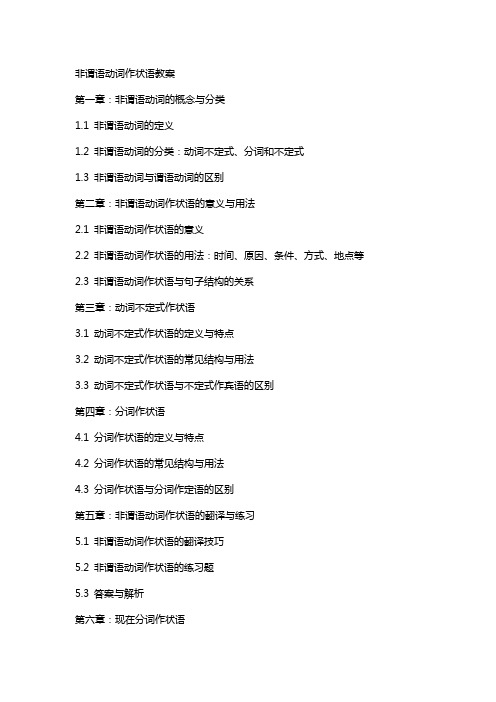
非谓语动词作状语教案第一章:非谓语动词的概念与分类1.1 非谓语动词的定义1.2 非谓语动词的分类:动词不定式、分词和不定式1.3 非谓语动词与谓语动词的区别第二章:非谓语动词作状语的意义与用法2.1 非谓语动词作状语的意义2.2 非谓语动词作状语的用法:时间、原因、条件、方式、地点等2.3 非谓语动词作状语与句子结构的关系第三章:动词不定式作状语3.1 动词不定式作状语的定义与特点3.2 动词不定式作状语的常见结构与用法3.3 动词不定式作状语与不定式作宾语的区别第四章:分词作状语4.1 分词作状语的定义与特点4.2 分词作状语的常见结构与用法4.3 分词作状语与分词作定语的区别第五章:非谓语动词作状语的翻译与练习5.1 非谓语动词作状语的翻译技巧5.2 非谓语动词作状语的练习题5.3 答案与解析第六章:现在分词作状语6.1 现在分词作状语的定义与特点6.2 现在分词作状语的常见结构与用法6.3 现在分词作状语与过去分词作状语的区别第七章:过去分词作状语7.1 过去分词作状语的定义与特点7.2 过去分词作状语的常见结构与用法7.3 过去分词作状语与现在分词作状语的区别第八章:非谓语动词作状语的句子分析8.1 非谓语动词作状语的句子结构分析8.2 非谓语动词作状语的句子类型分析8.3 非谓语动词作状语的句子实例分析第九章:非谓语动词作状语的语法辨析9.1 非谓语动词作状语与作宾语的语法辨析9.2 非谓语动词作状语与作定语的语法辨析9.3 非谓语动词作状语与作补语的语法辨析第十章:非谓语动词作状语的综合练习与解答10.1 非谓语动词作状语的综合练习题10.2 答案与解析10.3 非谓语动词作状语的实践与应用重点和难点解析一、非谓语动词的分类:动词不定式、分词和不定式补充说明:动词不定式作状语时,常常表示目的、结果、原因等;分词作状语时,可以表示时间、原因、条件等;不定式作状语时,通常表示方式、地点等。
非谓语动词作状语

非谓语动词作状语一不定式作状语(to)do/not(to)do1表目的He sat down to have a rest.They went there to visit their teacher.2.表示结果He is old enough to go to school.。
She is too tired to do the job.。
表出乎意料的结果:______________He woke up only/just to find everybody gone.他醒来发现大家都走了。
3表示原因在某些形容词作表语,表示喜、怒、衷、乐后跟不定式表示原因。
如:I am very glad to see you.I am so sorry to hear your mother is ill.4.强调动词不定式所表示的目的时,动词不定式可用in order to do(为了)或so as to(以便)+do。
注意:so as to不用于句首。
He got up early in order to/so as to catch the first bus.In order to pick up passengers,the bus stopped。
5.修饰全句,独立成分To tell you the truth,I have got no money about me.To be honest,I know nothing about it.二分词作状语分词作状语1.分词作状语的基本原则:(1)分词作状语时,分词的逻辑主语必须与句子的主语保持一致。
(2)分词作状语必须和句中主语含有逻辑上的主谓或动宾关系,主动doing,被动done例句:分词或分词短语作状语时,可以表时间、原因、结果、条件、让步、行为方式、伴随状况等。
Hearing the news,they got excited.(时间)Be careful while/when crossing the street.(时间)Having been bitten by a snake,she was frightened at it.(原因)Given a chance,I can surprise the world.(条件)The cup dropped to the ground,breaking into pieces.(结果)Having been told many times,he still repeated the same mistake.(让步)The teacher came into the lab,followed by some students.(伴随状况)例句:(1)Having worked there for30years,Haydn moved to London先后(2)Having been knocked down by the car for so long,the old man was sent tothe hospital.(3)Not having finished his work,he had to work extra hours at night.因为没有完成工作,他不得不晚上额外加班。
非谓语动词作状语

• He walked up and down the room, lost in thought.
注意:
• 1.某些动词的过去分词已经形容词化,常用于 一些系表结构中。此时的过去分词既不表被 动也不表完成,而表示一种状态。这样的词 有:lost;seated;hidden;lost/absorbed in; dressed in;tired of 等。
• Though beaten, we were not discouraged. • =Though we were beated, we..
• Once tasted, the dish is hard to forget. • =once it is tasted,语 的区别:
• 可表示原因.结果.条件.让步.方式伴随等,可转 化为相应的状语从句
• 1.表时间 • Walking out of the room, he saw the boy still
there.
• = when he walked out of the room, he...
• Having made full preparations, we are ready for the exam.
• Honestly speaking, he is not fit for the job. • Judging from his accent, he is from the
south.
三、过去分词ed作状语
• 过去分词做状语可表示被动和完成的动作。 • 表示时间、原因、条件、让步、结果、方式等,相
• If you don’t make use of time, you will regret.
高中英语语法填空之非谓语动词作状语和补语

语法填空之非谓语动词作状语和补语1.分析逻辑关系(1)作状语:①表目的、出乎意料的结果或在形容词后作状语,用不定式;②表伴随、时间或条件等要用现在分词/过去分词;③表自然而然的结果用现在分词。
(2)作补语:根据具体结构用(to) do/doing/done①如逻辑主语与非谓语动词之间是主谓关系,且表正在进行,用doing。
②如逻辑主语与非谓语动词之间是被动关系,且表完成,用done。
2.牢记5种用法①不定式作宾补:allow、ask、beg、command、encourage、expect、forbid、invite、persuade、tell等+sb. to do sth.。
②用省略to的不定式作宾补的动词:“五”看;“三”使;“两”听;“一”感觉。
“look at/see/watch/notice/observe; make/let/have; hear/listen to; feel”+sb.+do sth.。
注意:但在被动语态中作主语补足语要还原to,如be_made_to_do。
③have sb./sth.doing “让某人/某物一直做”;have sb./sth.done “让某人/某物被做”。
④主语+系动词+形容词(easy、hard、impossible、important等)+to do⑤too+adj./adv.+to do或adj./adv.+enough+to do3.固定句型识记不定式作补语:advise sb. to do allow sb. to do ask sb. to dobeg sb. to do cause sb. to do encourage sb. to do expect sb. to do forbid sb. to do force sb. to do help sb. (to) do invite sb. to do inspire sb. to do order sb. to do permit sb. to dopersuade sb. to dorequire sb. to doremind sb.to dotell sb. to dowant sb. to dowarn sb. to dowish sb. to dowait for sb. to docall on sb. to do 号召某人去做rely on sb. to do 指望某人做某事-ing 作补语catch sb. doing 发现、撞见某人做某事find sb. doing 发现某人做某事keep sb./sth. doing 使...处于...状态leave sb./sth doing 使...处于...状态课堂练习1.On the last day of our week-long stay, we were invited to attend a private concert on a beautiful farm on the North Shore under the stars, ________ (listen) to musicians and meeting interesting locals.2.You don't have to run fast or for long________ (see) the benefit.3.The government encourages farmers to grow corn instead of rice________ (improve) water quality.4.Once his message was delivered, he allowed me________ (stay) and watch. 5.They are required________ (process) the food that we eat, to recover from injury and for several other bodily functions.6.Nervously ________ (face) challenges, I know I will whisper to myself the two simple words “Be yourself”.7 ________ (enjoy)the convenience of digital payment, many senior citizens started to use smart phones.8.Ordinary soap,________ (use) correctly, can deal with bacteria effectively. 9.I need a new passport so I will have to have my photographs________ (take).10.People probably cooked their food in large pots, ________ (use) twigs (树枝) to remove it.课后练习Gabi Rizea only discovered his talent for woodcarving three years ago,and has since put 1to good use,saving dozens of old tree stumps (树桩) from 2 (remove) by turning them into impressive works of art.Rizea became a woodcarver 3(complete) by accident.Three years ago,after buying himself a new chainsaw(链锯),he 4(start) “playing” with it on a block of wood.He tried carving a human face into the wood,and to his surprise,it turned out pretty good.Today,he is so good at woodcarving that his home city allows him to workhis magic on old tree stumps and so far about 40 works of art 5(create) in the local parks.“In 99% of the cases,the wood just doesn’t match my ideas,” he said in an interview.“I first have to remove all the rotten parts,and sometimes,6is left isn’t enough for my designs.”Following his recent rise to fame,Rizea has been asked by many 7 (city),including the capital of Romania to transform their old tree trunks 8 works of art.He promises to honor their requests,but he will never repeat any of the artworks 9(find) in his home city.In spite of his obvious talent,the Romanian 10(art) recently got into an art school in order to fully master woodcarving.参考答案:1.it 2.being pletely4.started5.have been created6.what7.cities8.into9.found10.artist课后练习(二)How would you feel if you woke up and found your information in the computer—including your photos,your recent documents—no longer 1 (access)?What if you found out that they had been wiped from your computer, 2 (leave) you with nothing but heartache?Guess what?It happens to people every single day.Every day,people across the country head into their local Apple store in 3(tear),broken computer in hand,praying as they wait in line 4an expensive repair might,just might,recover the priceless,irreplaceable files.A few get lucky. 5for the rest,there’s nothing anyone can do 6(help).Hasn’t it happened to you?If your computer remains unprotected,it will,and it’s only 7matter of time.But thanks to recent breakthroughs in computer backup(备份) technology,you now have a number of options to choose from,and if you’re smart,when your computer 8(crash),you shouldn’t have any trouble 9(get) 100% of your files back that same day.I’m not talking about an external hard drive.I’m talking about an online backup solution that runs 10(quiet) inthe background on your computer.If you have one installed (安装),when your computer crashes,you’ll be just one click away from bringing your files back to life.参考答案:1.accessible2.leaving3.tears4.that5.But6.to help7.a8.crashes9.getting10.quietly。
非谓语动词作状语技巧
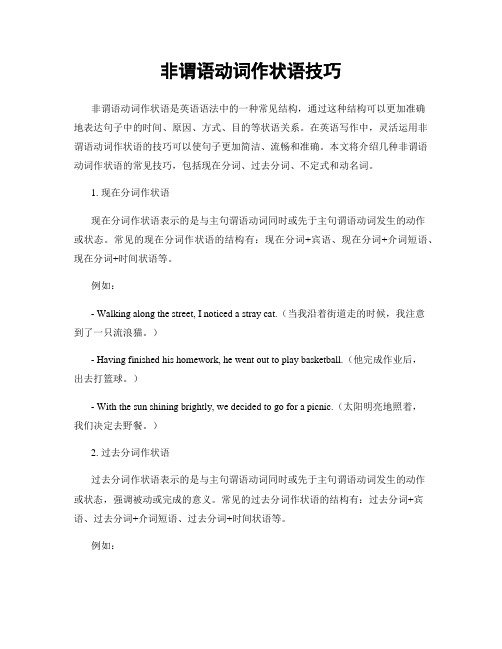
非谓语动词作状语技巧非谓语动词作状语是英语语法中的一种常见结构,通过这种结构可以更加准确地表达句子中的时间、原因、方式、目的等状语关系。
在英语写作中,灵活运用非谓语动词作状语的技巧可以使句子更加简洁、流畅和准确。
本文将介绍几种非谓语动词作状语的常见技巧,包括现在分词、过去分词、不定式和动名词。
1. 现在分词作状语现在分词作状语表示的是与主句谓语动词同时或先于主句谓语动词发生的动作或状态。
常见的现在分词作状语的结构有:现在分词+宾语、现在分词+介词短语、现在分词+时间状语等。
例如:- Walking along the street, I noticed a stray cat.(当我沿着街道走的时候,我注意到了一只流浪猫。
)- Having finished his homework, he went out to play basketball.(他完成作业后,出去打篮球。
)- With the sun shining brightly, we decided to go for a picnic.(太阳明亮地照着,我们决定去野餐。
)2. 过去分词作状语过去分词作状语表示的是与主句谓语动词同时或先于主句谓语动词发生的动作或状态,强调被动或完成的意义。
常见的过去分词作状语的结构有:过去分词+宾语、过去分词+介词短语、过去分词+时间状语等。
例如:- Exhausted from the long journey, she went straight to bed.(因为长途旅行而疲惫不堪,她直接上床睡觉。
)- Having been invited to the party, I couldn't refuse.(因为被邀请参加派对,我不能拒绝。
)- Surprised by the sudden news, they didn't know how to react.(因为突然的消息,他们不知道如何反应。
非谓语作状语的5种形式

非谓语作状语的5种形式非谓语动词作状语主要有以下五种形式:1. 分词作状语(现在分词和过去分词)- 现在分词表示主动和进行,通常表示时间、原因、条件或伴随状况。
- 过去分词表示被动和完成,通常表示时间、原因、条件或伴随状况。
Example:- (现在分词) Running in the park, I found a lost wallet.- (中文翻译) 在公园跑步时,我找到了一个丢失的钱包。
- (过去分词) Given more time, I could finish the task.- (中文翻译) 如果给我更多的时间,我就能完成这个任务。
2. 不定式作状语- 表示目的、结果或原因。
Example:- (目的) To improve my English, I read books in English every day.- (中文翻译) 为了提高我的英语水平,我每天阅读英文书籍。
- (结果) He worked hard to pass the exam, only to fail.- (中文翻译) 他努力工作以通过考试,结果却失败了。
- (原因) To see her smile is to understand her happiness.- (中文翻译) 看到她的微笑就能理解她的幸福。
3. 句子作状语- 通常是一个完整的句子,用来修饰主句,表示原因、条件、时间等。
Example:- (原因) Because it was raining, we canceled the trip.- (中文翻译) 因为下雨,我们取消了旅行。
- (条件) If it rains, we will stay at home.- (中文翻译) 如果下雨,我们就待在家里。
- (时间) When the bell rings, the class will start.- (中文翻译) 当铃声响起时,课程就开始了。
非谓语动词作状语
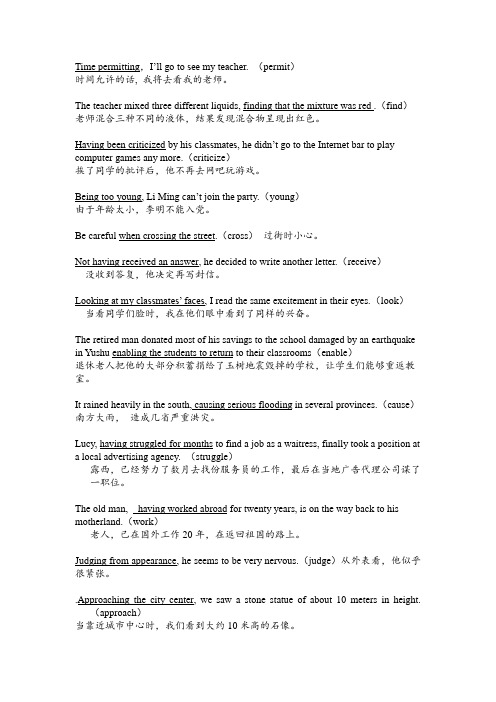
Time permitting,I’ll go to see my teacher. (permit)时间允许的话, 我将去看我的老师。
The teacher mixed three different liquids, finding that the mixture was red .(find)老师混合三种不同的液体,结果发现混合物呈现出红色。
Having been criticized by his classmates, he didn’t go to the Internet bar to play computer games any more.(criticize)挨了同学的批评后,他不再去网吧玩游戏。
Being too young, Li Ming can’t join the party.(young)由于年龄太小,李明不能入党。
Be careful when crossing the street.(cross)过街时小心。
Not having received an answer, he decided to write another letter.(receive)没收到答复,他决定再写封信。
Looking at my classmates’ faces, I read the same excitement in their eyes.(look)当看同学们脸时,我在他们眼中看到了同样的兴奋。
The retired man donated most of his savings to the school damaged by an earthquake in Yushu enabling the students to return to their classrooms(enable)退休老人把他的大部分积蓄捐给了玉树地震毁掉的学校,让学生们能够重返教室。
It rained heavily in the south, causing serious flooding in several provinces.(cause)南方大雨,造成几省严重洪灾。
非谓语动词作状语
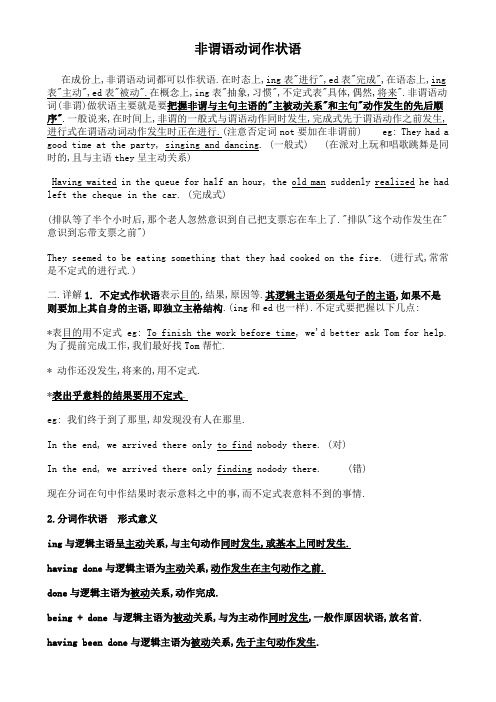
非谓语动词作状语在成份上,非谓语动词都可以作状语.在时态上,ing表"进行",ed表"完成",在语态上,ing 表"主动",ed表"被动".在概念上,ing表"抽象,习惯",不定式表"具体,偶然,将来".非谓语动词(非谓)做状语主要就是要把握非谓与主句主语的"主被动关系"和主句"动作发生的先后顺序".一般说来,在时间上,非谓的一般式与谓语动作同时发生,完成式先于谓语动作之前发生,进行式在谓语动词动作发生时正在进行.(注意否定词not要加在非谓前)eg: They had a good time at the party, singing and dancing. (一般式)(在派对上玩和唱歌跳舞是同时的,且与主语they呈主动关系)Having waited in the queue for half an hour, the old man suddenly realized he had left the cheque in the car. (完成式)(排队等了半个小时后,那个老人忽然意识到自己把支票忘在车上了."排队"这个动作发生在"意识到忘带支票之前")They seemed to be eating something that they had cooked on the fire. (进行式,常常是不定式的进行式.)二.详解1. 不定式作状语表示目的,结果,原因等.其逻辑主语必须是句子的主语,如果不是则要加上其自身的主语,即独立主格结构.(ing和ed也一样).不定式要把握以下几点:*表目的用不定式 eg: To finish the work before time, we'd better ask Tom for help. 为了提前完成工作,我们最好找Tom帮忙.* 动作还没发生,将来的,用不定式.*表出乎意料的结果要用不定式.eg: 我们终于到了那里,却发现没有人在那里.In the end, we arrived there only to find nobody there. (对)In the end, we arrived there only finding nodody there. (错)现在分词在句中作结果时表示意料之中的事,而不定式表意料不到的事情.2.分词作状语形式意义ing与逻辑主语呈主动关系,与主句动作同时发生,或基本上同时发生.having done与逻辑主语为主动关系,动作发生在主句动作之前.done与逻辑主语为被动关系,动作完成.being + done 与逻辑主语为被动关系,与为主动作同时发生,一般作原因状语,放名首.having been done与逻辑主语为被动关系,先于主句动作发生.eg: Given more time, he would finish the plan. 多给些时间他就能完成计划.Getting off the bus, she saw her mother. 一下车她就看见了她妈妈.Having passed the exam, she told everybody the good news.通过了考试后,她把这个好消息告诉了每个人.Having been told many times, she still couldn't understand me.跟她说了很多次她还是不能理解我的意思.Being asked to give a speech, she didn't know how to refuse.被邀做演讲时,她不知道怎么拒绝.注:以上各点也适用于非谓语动词做其它成份的情况.混合练习(按步骤:*找主语 *找主句谓语 *判断非谓与主语的主被动关系 *比较非谓和主句动作先后,对照上表来做就不容易出错了)1 _____ their service, the workers of the hotel are active in learning English.A. ImprovingB. To improveC. ImprovedD. Having improved【解析】本题考查非谓语动词作状语。
(完整word)非谓语动词作状语全解讲解

非谓语动词作状语全解不定式和分词作状语的用法一、不定式作状语可以作:1。
主要用作目的状语。
常与 in order to do (为了或 so as to do(以便连用。
so as to 不用于居首。
He got up early in order to catch the first bus. 他早起为了赶上第一班车。
He sat down to have a rest。
他坐下来休息。
He went to France to learn French. 他去法国学习法语.They stood by the roadside to talk about the plan.他们站在路边为的是谈论这个计划。
They stopped to ask the way. 他们停下来问路. (停下来的目的2。
作结果状语。
表示出乎意料的结果。
做结果状语的不定式只能出现在句子的末尾,常见的不定式动词有:to find, to hear, to see, to be told, to form, to give, to make,to produce 等。
He hurried to the station only to find the train gone. 他匆匆忙忙地赶到火车站,发现火车已经开走了.He woke up to find everybody gone。
他醒来发现大家都走了。
His family was too poor to support him。
他的家庭太穷,不能维持他的生活. The boy is not tall enough to reach the book shelf。
这男孩个子不够高, 手伸不到书架。
He is old enough to go to school。
他到上学年龄了.He lifted a rock only to drop it on his own feet.他搬起石头砸了自己的脚。
非谓语动词作状语和补足语

不定式可以单独作目的状语,有时为了强调目的性, 不定式可以单独作目的状语,有时为了强调目的性, 在不定式前可以加上in 在不定式前可以加上 order, so as。 。 e.g. To succeed, one must first believe in himself. In order to keep warm, we shut all the windows. 不定式表结果,常用在 结构中。 不定式表结果,常用在too… to, enough… to结构中。 结构中 有时不定式前加上only,表示出人意料的结果。 有时不定式前加上 ,表示出人意料的结果。 e.g. The child is old enough to dress himself. We hurried to the station only to be told that the train had left. The husband left his wife, never to return.
有些感官动词和使役动词后常跟不带符号to的不定 有些感官动词和使役动词后常跟不带符号 的不定 式做宾语补足语,表示动作的整个过程。 式做宾语补足语,表示动作的整个过程。 一感(feel), 二听 二听(hear, listen to), 三使役 三使役(make, 如:一感 let, have), 五看 五看(see, look at, watch, notice, observe)。 。 e.g. We noticed him enter the house. The boss made them work twelve hours a day. 改成被动结构必须还原to to。 改成被动结构必须还原to。 e.g. He is often heard to sing the song.
非谓语动词之现在分词作状语

VS
在处理主谓一致问题时,需要注意分 词短语中代词的性别和数,以确保与 主句主语一致。
逻辑关系问题
在使用现在分词作状语时,需要确保其与主句之间的逻辑关系清晰。现在分词描述的动作或状态应与主句的动作或状态有明 确的因果、条件或时间关系。
在写作中,应避免使用冗余的现在分词状语,以免造成句子结构复杂和语义混淆。同时,要确保现在分词与主句之间的连接 词使用得当,以明确表达逻辑关系。
结构独立性
02
03
结构复杂性
现在分词作状语通常与主句结构 紧密相连,而从句则可以独立成 句。
现在分词作状语通常结构简单, 而从句可能会因为包含多个句子 成分而显得复杂。
省略情况
省略频率
现在分词作状语在口语中经常被省略,而从句则相对 较少被省略。
省略条件
现在分词作状语的省略通常需要满足一定的语境条件 ,而从句的省略则需要满足特定的语法规则。
语态
现在分词作状语通常表示主动语态,描述主语主动执 行的动作或状态。
位置
位于句首
现在分词作状语可以位于句首,作为句子的开 头部分。
位于句中
现在分词作状语也可以位于句中,紧跟在主语 之后,作为谓语的补充说明。
位于句末
现在分词作状语还可以位于句末,作为句子的结尾部分。
02 现在分词作状语的用法
时间状语
伴随状语
总结词
表示两个动作同时发生或存在某种关联
详细描述
现在分词短语放在句首,表示与主句动作同 时发生的另一个动作。例如,“Walking along the beach, he felt the warm sand beneath his feet.”(沿着海滩走,他感到 脚下温暖的沙子。)
3非谓语动词作状语的归纳

第3讲非谓语动词作状语的归纳教学目标:在前面非谓语动词单项选择的基础上,进行理论和实践的提高,争取在综合能力上有所突破。
一、不定式做状语目的状语:Helen had to shout to make herself heard above the sound od the music.注意:为了强调动词不定式所表示的目的的时候,动词不定式可用in order to,或 so as to来强调。
So as to 不用于句首。
如:He got up early in order to catch the first bus.The bus stopped so as to pick up passengers.意外的结果:He hurried to the station only to find that the train had left.结果状语:My grandmother lived to see the liberation of China.条件状语:To look at him, you would like him.在某些表示喜怒哀乐的形容词后表示原因。
如:I am very glad to see you .I am so sorry to hear about your failure in business.在带有enough, too的句子里,做程度状语。
如:He was too excited not to say a few words.He is old enough to go to school.二、分词作状语1.分词作状语在形式上的选择形式意义Doing 与句中的主语在逻辑上是主动关系,与句中谓语同时发生,或几乎同时发生Having done 与句中的主语在逻辑上是主动关系,先于谓语动词发生Done 与句中的主语在逻辑上是被动关系,时间性不确定Being done 与句中的主语在逻辑上是被动关系,与谓动同时发生,一般做原因于句首Having been done 与句中的主语在逻辑上是被动关系, 且先于谓语动词发生2.分词作状语的基本原则分词作状语时,分词的逻辑主语必须与句子的主语保持一致。
非谓语动词作状语之分词作状语

非谓语动词作状语之分词作状语一、考点风向标高考完形填空、阅读理解中〔长难句分析〕怎么考?高考语法填空中〔已给单词正确形式填空〕高考短文改错中运用在高考作文中,必得高分二、考场点将台动词不定式〔to do〕非谓语动词作状语现在分词〔doing〕过去分词〔done〕构成形式:总结:分词做状语〔时间、原因、结果、条件、让步、方式、伴随等〕:doing 与句子主语是主动关系,表示与谓语动词同时或根本同时发生having done 与句子主语是主动关系,表示先于谓语动词发生done与句子主语是被动关系,表示完成being done与句子主语是被动关系,表示与谓语动词同时发生,一般在句首做原因状语having been done与句子主语是被动关系,表示先于谓语动词发生三、开始练兵请观察以下例句,找出非谓语动词,并且判断做什么成分1. Asked why he did it,he said it was his duty. ( )2. Hearing the news, they immediately set off for shanghai.( )3. He wandered down the street, not knowing where to go. ( )4. His parents died in the war, leaving him an orphan. ( )5. Knowing where I live,he never comes to see me. ( )6. The old man got on the bus, supported by a girl. ( )7. Having finished his homework, Tom went to play basketball. ( )8. Having been told many times, he still repeated the same mistakes. ( )9. Working hard, you’ll succeed one day. ( )10.The students came into the classroom, talking and laughing. ( )11. Being repaired now,this classroom can not be used. ( )TIPS:仔细观察主从句的结构,看看它和复合句有什么区别?总结归纳:〔1〕非谓语句式特点复合句句式特点1. 非谓语动词+句子 1. 主句+连词+从句2. 句子+非谓语动词 2. 连词+从句+主句〔2〕解题技巧分析句子结构,找主从句的主语非谓语动词作状语三步法确定非谓语动词与主句主语的主被动关系非谓语动词与谓语动词的时间先后关系实战模拟1. 找主语eg:the people were in the park,〔enjoy〕themselves in the sunshine.2. 辩关系eg:〔raise〕in the poorest area of Glasgow,he had a long,hard road to becoming a football star.3. 看动作eg:〔work〕for two days,Steve managed to finish his report on schedule. 技能练兵场一、语法填空1. Like ancient sailors,birds can find their ways 〔use〕the sun and the stars.2. Write to the editor, (hope) that the editor would be able to help her.3. (compare)different cultures, we often pay attention to the differences without noticing the mainly similarities.4. (compare) with the size of the whole earth, the biggest ocean does not seem big at all.易错练习1. The secretary worked late into night, a long speech.(prepare)2.The secretary worked late into night a long speech. (prepare)3. He (tell) many times, but he still couldn’t understand it.4. (tell) many times, he still couldn’t understand it.二、短文改错1. Following by the officers, the general inspected the army.2. I found a small house standing in a field with a light shone from the sitting room.3. He would also catch the food throwing to him from the other side of the room.三、作文运用(1)用非谓语动词合并句子eg. ①We were touched by the teacher's words.②We decided to work hard.Combination (合并): Touched by the teacher’s words, we decided to work hard..1) ①We sat around the table.②He sang songs together.Combination:____________________________________________________________2) ①He didn’t know what to do.②He turned to his teacher.Combination:____________________________________________________________3) ①He worked hard.②He earned more money.Combination:____________________________________________________________ 〔2〕用非谓语动词翻译句子1. 知道我们的图书馆要买书,我想提一些建议。
非谓语动词作状语之分词作状语
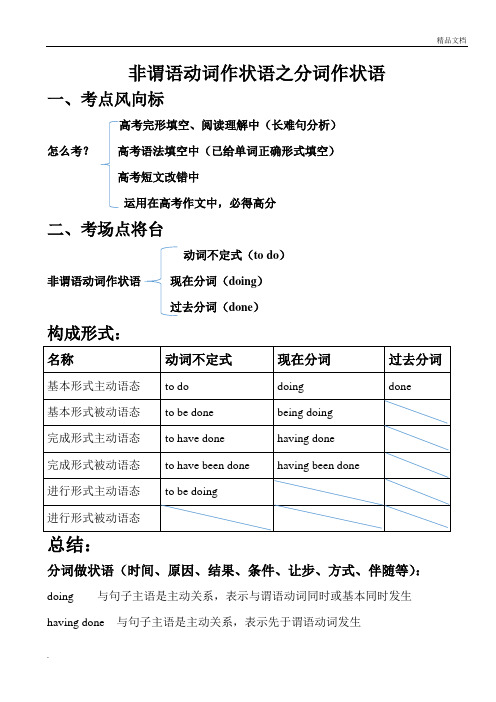
非谓语动词作状语之分词作状语一、考点风向标高考完形填空、阅读理解中(长难句分析)怎么考?高考语法填空中(已给单词正确形式填空)高考短文改错中运用在高考作文中,必得高分二、考场点将台动词不定式(to do)非谓语动词作状语现在分词(doing)过去分词(done)构成形式:总结:分词做状语(时间、原因、结果、条件、让步、方式、伴随等):doing 与句子主语是主动关系,表示与谓语动词同时或基本同时发生having done 与句子主语是主动关系,表示先于谓语动词发生done与句子主语是被动关系,表示完成being done与句子主语是被动关系,表示与谓语动词同时发生,一般在句首做原因状语having been done与句子主语是被动关系,表示先于谓语动词发生三、开始练兵请观察下列例句,找出非谓语动词,并且判断做什么成分1. Asked why he did it,he said it was his duty. ( )2. Hearing the news, they immediately set off for shanghai.( )3. He wandered down the street, not knowing where to go. ( )4. His parents died in the war, leaving him an orphan. ( )5. Knowing where I live,he never comes to see me. ( )6. The old man got on the bus, supported by a girl. ( )7. Having finished his homework, Tom went to play basketball. ( )8. Having been told many times, he still repeated the same mistakes. ( )9. Working hard, you’ll succeed one day. ( )10.The students came into the classroom, talking and laughing. ( )11. Being repaired now,this classroom can not be used. ( )TIPS:仔细观察主从句的结构,看看它和复合句有什么区别?总结归纳:(1)非谓语句式特点复合句句式特点1. 非谓语动词+句子 1. 主句+连词+从句2. 句子+非谓语动词 2. 连词+从句+主句(2)解题技巧分析句子结构,找主从句的主语非谓语动词作状语三步法确定非谓语动词与主句主语的主被动关系非谓语动词与谓语动词的时间先后关系实战模拟1. 找主语eg:the people were in the park,(enjoy)themselves in the sunshine.2. 辩关系eg:(raise)in the poorest area of Glasgow,he had a long,hard road to becoming a football star.3. 看动作eg:(work)for two days,Steve managed to finish his report on schedule. 技能练兵场一、语法填空1. Like ancient sailors,birds can find their ways (use)the sun and the stars.2. Write to the editor, (hope) that the editor would be able to help her.3. (compare)different cultures, we often pay attention to the differences without noticing the mainly similarities.4. (compare) with the size of the whole earth, the biggest ocean does not seem big at all.易错练习1. The secretary worked late into night, a long speech.(prepare)2.The secretary worked late into night a long speech. (prepare)3. He (tell) many times, but he still couldn’t understand it.4. (tell) many times, he still couldn’t understand it.二、短文改错1. Following by the officers, the general inspected the army.2. I found a small house standing in a field with a light shone from the sitting room.3. He would also catch the food throwing to him from the other side of the room.三、作文运用(1)用非谓语动词合并句子eg. ①We were touched by the teacher's words.②We decided to work hard.Combination (合并): Touched by the teacher’s words, we decided to work hard..1) ①We sat around the table.②He sang songs together.Combination:____________________________________________________________2) ①He didn’t know what to do.②He turned to his teacher.Combination:____________________________________________________________3) ①He worked hard.②He earned more money.Combination:____________________________________________________________ (2)用非谓语动词翻译句子1. 知道我们的图书馆要买书,我想提一些建议。
- 1、下载文档前请自行甄别文档内容的完整性,平台不提供额外的编辑、内容补充、找答案等附加服务。
- 2、"仅部分预览"的文档,不可在线预览部分如存在完整性等问题,可反馈申请退款(可完整预览的文档不适用该条件!)。
- 3、如文档侵犯您的权益,请联系客服反馈,我们会尽快为您处理(人工客服工作时间:9:00-18:30)。
• 1.表时间 • Walking out of the room, he saw the boy still
.
• = when he walked out of the room, he...
• Having made full preparations, we are ready for the exam.
• = The gril came into the classroom and they sang and danced.
注意:
• 1 为了使动词ing形式作状语表达的意思更 明确,可在动词ing前加上适当的连词: when 、while 、if 、though 、unless 、 even 等.
6.方式.伴随或补充说明(并列结构)
• He lay on the grass, staring at the sky for a long time.
• = He lay on the grass and stared at the ...
• The gril came into the classroom, singing and dancing.
telephone ring.
• Looking out through the window, the garden was beautiful.
• Looking out through the window, we found a beautiful garden.
3.独立成分作状语
• 常见的分词短语有: • Frankly speaking ; honestly speaking; • Judging from ; considering; to tell the truth
• = Athough they knew all this, they...
• Studying from morning till night, i didn’t pass the exam.
• = Athough i studied from morning till night, i ...
非谓语动词作状语
2)结果状语
• 动词不定式和ving形式作结果状语区别: • 1 动词不定式作结果状语通常表示意想不到
的结果,常与only连用构成only to do sth • 2 动词ing形式作结果状语通常表示自然而
然的情况或结果。
• He ran to the station only to find the train had left.
• = The fire lasted nearly a month and left nothing valuable.
4.表条件
• Working hard at your lessons, you will succeed.
• =if you work hard at your lessons, you...
• His father died, leaving him a lot of debts.
3)原因状语
We are excited to hear the news.
4) 条件状语
• To turn to the left, you could find a post office.
二 动词ing形式作状语
• =As i didn’t master the way of studying, i ...
3.表结果(并列谓语)
• His father died, leaving him a lot of money. • = his father died and left him ...
• The fire lasted nearly a month, leaving nothing valuable.
• If you don’t make use of time, you will regret.
• =Not making use of the time, you will ...
5.表让步
• Knowing all this, they made me pay for the damage.
• Honestly speaking, he is not fit for the job. • Judging from his accent, he is from the
south.
三、过去分词ed作状语
• 过去分词做状语可表示被动和完成的动作。 • 表示时间、原因、条件、让步、结果、方式等,相
• Don’t talk while having dinner. • Once losing the chance, you can’t easily
find it.
2.动词ing形式做状语,其逻辑主语 必须与句子的主语一致。
• While reading the book, the telephone rang. • While reading the book, she heard the
当于相应的状语从句。 • 1 表时间 • Seen from the top of the hill, the city looked like a
big garden. • = when it is seen from the top of the hill, the city...
• Asked what had happened, he lowered his head. • =when he was asked what had happened, he...
• = After we have made full preparations, we...
2.表原因
• Being ill, he didn’t go to school yesterday. • = Because he was ill, he...
• Not mastering the way of studying, i didn’t get a good result.
